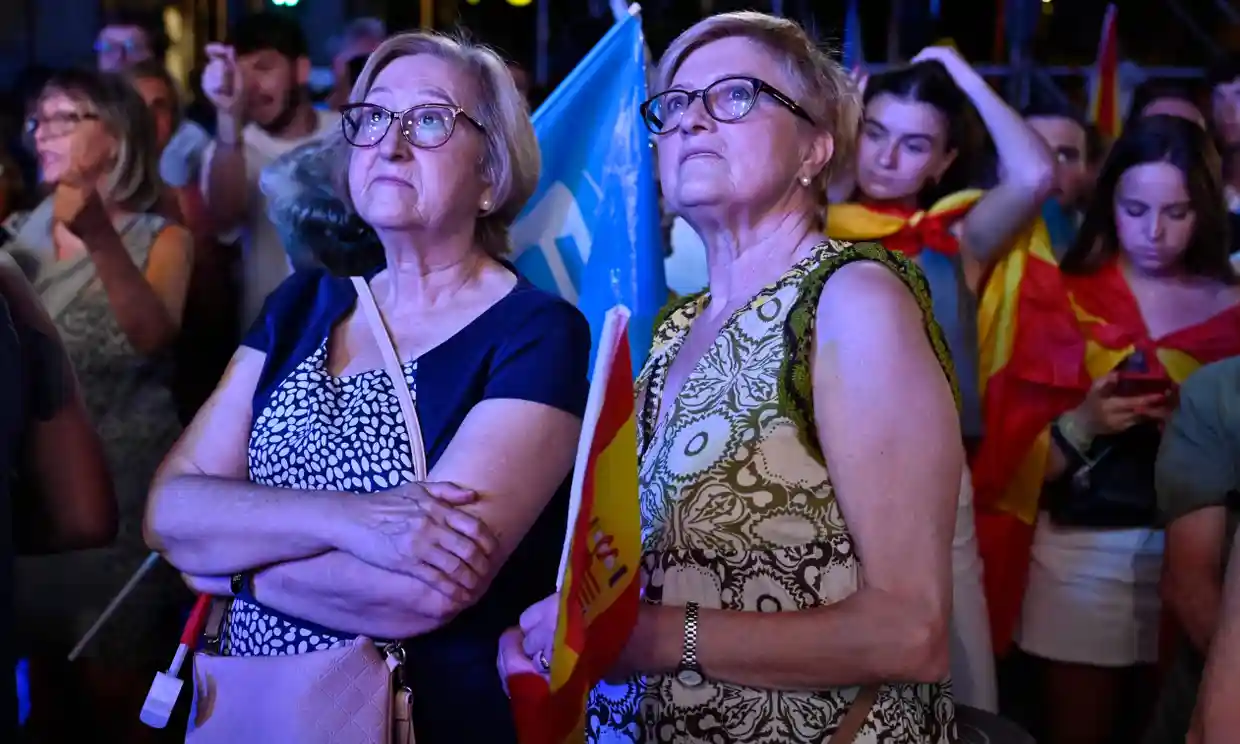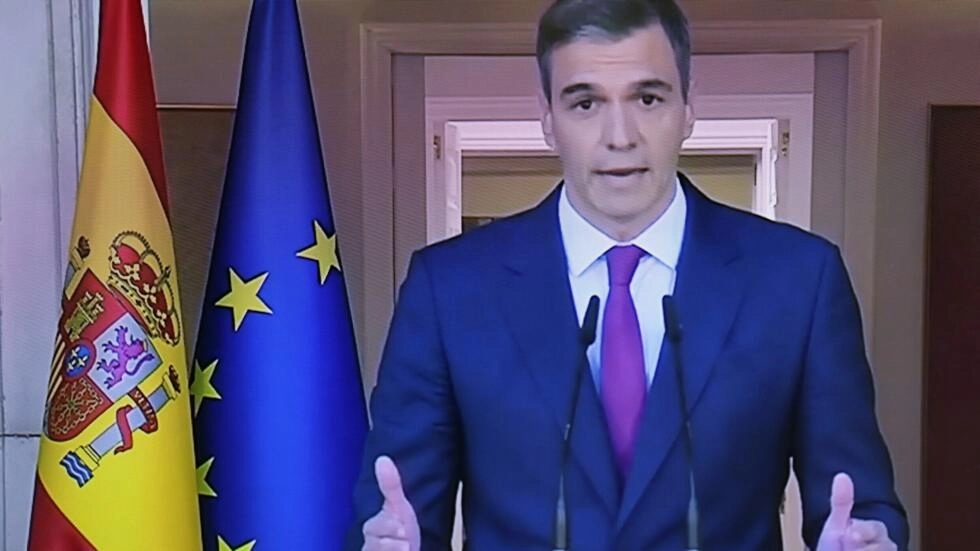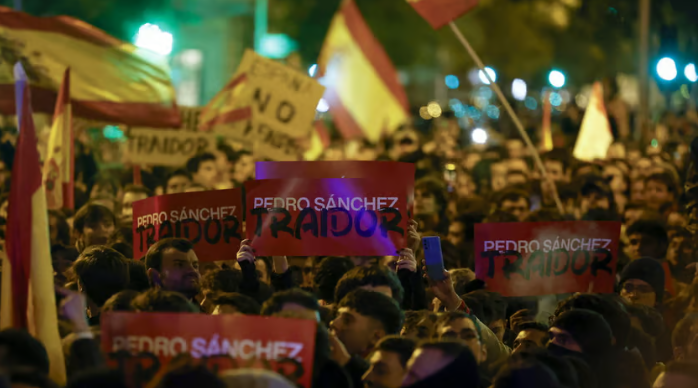This article is more than
1 year oldSpain elections: hung parliament after conservatives fail to secure expected majority

Spain’s opposition conservative party secured the most number of seats in national elections but looked unlikely to secure a coalition rightwing majority after a vote that had raised fears of the far right entering government for the first time since the country returned to democracy after General Franco’s death five decades ago.
Although the polls had consistently predicted that the opposition conservative People’s party (PP) would cruise past the Spanish Socialist Workers party (PSOE) to secure an emphatic win in Sunday’s election, early results quickly established that the race was going to be much tighter.
With 100% of the vote counted, the PP had won 136 seats to the PSOE’s 122. The conservatives’ potential coalition partners in the far-right Vox party had taken 33 seats – well down on the 52 they picked up in the last election – and PSOE’s allies in the new, far-left Sumar alliance were in fourth place with 31 seats.
The count showed that the political hue of the next government is far from a foregone conclusion, with the left and right blocs running almost neck and neck in their race to get as close to 176 seats as possible. As Monday approached, the PP and Vox had secured 169 seats to the PSOE and Sumar’s 153, suggesting Spain is in for weeks of negotiating and horse-trading as the rival camps explore their options for government.
Negotiations by the two blocs to form governments will start after a new parliament convenes on 17 August. King Felipe VI will invite the PP’s leader, Alberto Núñez Feijóo, to try to secure the prime ministership. In a similar situation in 2015, PP leader Mariano Rajoy declined the king’s invitation, saying he could not muster the support.
If Feijoo declines, the king may turn to the prime minister, Pedro Sánchez, with the same request. The law does not set a deadline for the process but if no candidate secures a majority within two months of the first vote on the prime minister, new elections must be held.

Photograph: Juan Carlos Rojas/Shutterstock
Sánchez said late on Sunday that the “reactionary” parties of the Spanish right had failed at the polls.
“We’ve won more votes, more seats and a bigger share of the vote than we did four years ago,” he told crowds gathered outside the PSOE’s headquarters in Madrid.
“The retrograde, reactionary block that sought to undo the advances of the past four years has failed.”
The PP’s leader, Feijóo, thanked those who had helped his party to victory and said he intended to try to form a government as soon as possible.
“Our duty now is to stop a period of uncertainty opening up in Spain,” he said. “As the candidate for the party that won the most votes, I believe my duty is to open up the dialogue as soon as possible and to try to govern our country in accordance with the election results and the election victory.”
Sanchez – who gambled on the snap election after the PSOE suffered a drubbing in May’s regional and municipal elections, had billed the poll as a stark choice between the forces of progress and the forces of reactionary conservatism. He had argued that only the PSOE and the Sumar alliance, which includes Podemos and is led by his deputy prime minister and labour minister, Yolanda Díaz, could defend and deliver the progressive agenda he has pursued over the past four years.
On Sunday night, Díaz told Sumar supporters: “We’ve won. Today we have a better country. From tomorrow, we have to keep winning rights and we are committed to doing that – more rights for women, for LGBTI people and for workers.”

Photograph: Oscar J Barroso/AFP7/Shutterstock
Vox’s leader, Santiago Abascal, congratulated the PP’s Feijóo on his victory but added: “I’d like to point out something that’s bad news for many Spaniards: despite losing the election, Pedro Sánchez can block the formation of a new government. Worse still, Pedro Sánchez could even be invested as prime minister with the help of communists, [Catalan] independence supporters and terrorists.”
Although the PP had consistently led the polls and waged an aggressive campaign, it suffered a poor final week as the focus shifted to Feijóo. He had already been left looking awkward after his claims about the PP’s track record on pensions turned out to be untrue, but was then criticised for the sexist tone of an apparent reference to Díaz’s makeup.
Feijóo had urged Spaniards to vote “to bring our country together again” and said that, unlike Sánchez, he was beholden to no one.
“I’ve got no debts or deals with anyone,” he told supporters in the Galician city of A Coruña on Friday. “I don’t need to answer to anyone except the Spanish people.”
An Ipsos poll for La Vanguardia this month found that the economy was the single biggest issue for voters, with 31% of those surveyed putting it at the top of their list. Next was unemployment (10%) and healthcare (9%). Immigration, one of Vox’s favourite talking points, was the most important issue for just 2% of those polled.
Keywords
Newer articles
<p data-qa="subheadline">Lawmakers sped the proposal, the most significant threat to the popular app’s U.S. operations, by tying it to a sprawling funding package offering...
Ukraine war: Kyiv uses longer-range US missiles for first time
How soon could US ban TikTok after Congress approved bill?
TikTok faces US ban as bill set to be signed by Biden
‘LOSING CREDIBILITY’: Judge explodes at Trump lawyers as case heats up
Claim rapper ‘made staff watch her have sex’
KANYE WEST PLANS TO LAUNCH 'YEEZY PORN' ... Could Be Coming Soon!!!
Megan Thee Stallion’s Ex-Makeup Guru Talks. It’s Not Pretty.
King’s Funeral Plans Dusted Off—as Health Remains a Mystery
The EU warned TikTok’s new rewards feature could be addictive. Now the app's suspended it




